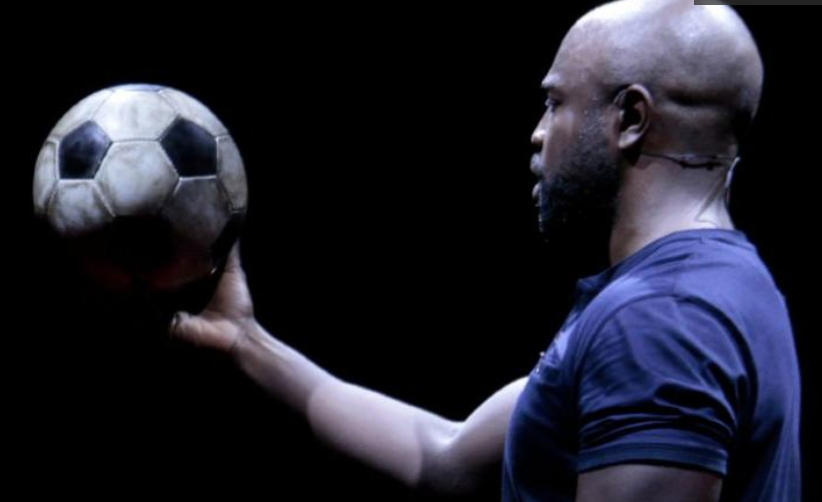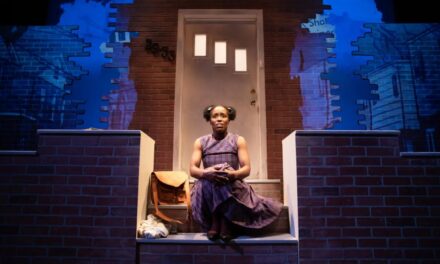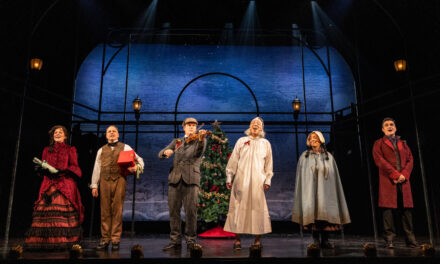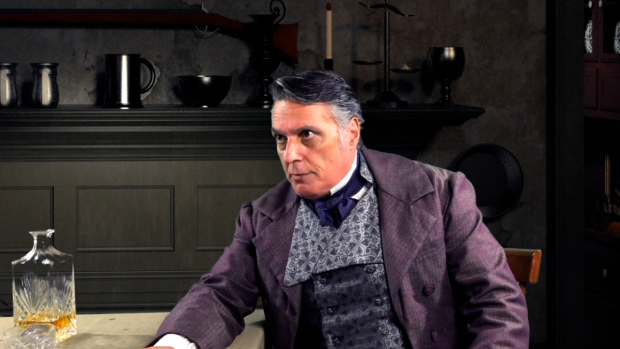by Carol Rocamora

An actor stands alone in the cavernous, COVID-empty Olivier Theatre, performing on a red-carpeted platform in the shape of a cross. It’s a striking visual image, reflecting the identity crisis of a Black man in England today.
“Do I have to be told who I am in my own country?” cries the title character of Death of England: Delroy, the passionate 90-minute lament written by Clint Dyer and Roy Williams. Tragically, according to these co-authors, Delroy does.
Given the urgency of the Black Lives Matter movement, it’s very fortunate that this one-man show was videotaped on November 4. That was the show’s official opening night – and closing night too, because of the second COVID London lockdown – performed before a scant, socially-distanced audience in the Royal National Theatre’s newly renovated Olivier. And now it’s streaming on their website for a public desperate for live theatre.
Delroy, played with passionate intensity by Michael Balogun, tells a story of his cruel awakening as a Black man in England. Formerly, he had prided himself as a “good citizen” – an aspiring worker man of the lower-middle class, a flat-owner, a taxpayer, a Brexit-championing voter. His best mate Michael is white (featured in a previous monologue called Death of England by the same authors.) The love of his life is Carly (Michael’s sister, also white), who is about to have Delroy’s baby.
But Delroy’s world unravels when the inevitable happens and he falls victim to racial profiling. On his way to the hospital (Carly is in labor), he’s stopped by three policemen who mistake him for another Black man they are pursuing. ““What is it about three large white men holding you against the wall that makes you feel small?” Delroy asks in a torrent of helpless fury (laced with sardonic humor). At the station, when questioned if he’s had “previous convictions,” Delroy explodes, curses his questioners, and is charged and detained. “I was now a racist picture of a Black man. Now that ain’t fair,” he tells us in another ironic understatement.
Humiliated, enraged, Delroy confronts the two most important people in his life – Carly and Michael – both of whom are white. “I wanted him to see me, finally see me,” he says of Michael, as Delroy rails against racism in Europe. Delroy is further devastated by Carly’s stereotyping him as an irresponsible father because of his late arrival at the hospital (not his fault, of course). At his trial, Delroy apologies, pleading: “I’m a good guy stopped on a bad day…. I forgot my place….Wouldn’t you, Your Honor? It’s all about context.” But his pleas fall on deaf ears. He finds himself sinking into the stereotype forced upon him.
Balogun’s non-stop narrative is a theatrical tour de force, performed with a powerful, raging life force and supported with superb technique. He storms up and down the red-carpeted cross (designed by Sadeysa Greenaway-Baily and ULTZ) – like a man on a desperate crusade for understanding.
“Get to know me, get to like me, get to respect me, get to value me, get to trust me – do the f***ing work!” Delroy cries toward the end of his nonstop monologue. It’s the same appeal I heard last fall in Keith Hamilton Cobb’s moving American Moor at the Cherry Lane Theatre – another one-man show performed by a Black actor pleading: “See me! Hear me!” It’s a cry that we’re hearing in recent new works about the crisis of Black identity – in Antoinette Nwandu’s Pass Over, Jackie Sibblies Drury’s Fairview, and others. Expect to hear it over and over again, with increasing urgency, until it is finally heard.
Death of England: Delroy, written by Clint Dyer and Roy Williams, directed by Dyer, streaming on the Royal National Theatre YouTube channel.





















